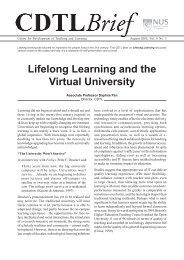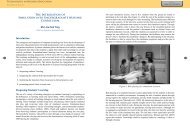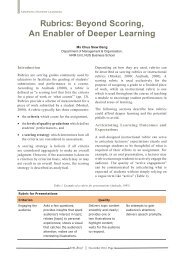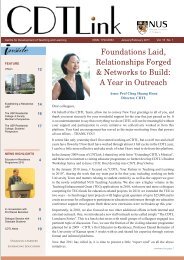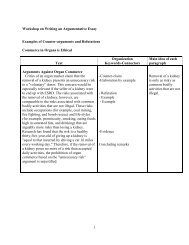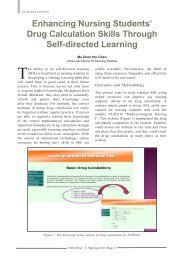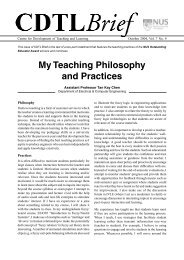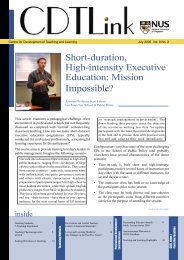Effective Interpersonal Skills by Dr Radhika Jaidev and Ms Peggie ...
Effective Interpersonal Skills by Dr Radhika Jaidev and Ms Peggie ...
Effective Interpersonal Skills by Dr Radhika Jaidev and Ms Peggie ...
- No tags were found...
Create successful ePaper yourself
Turn your PDF publications into a flip-book with our unique Google optimized e-Paper software.
1CDTL-CELC WORKSHOP:EFFECTIVE INTERPERSONAL SKILLSFacilitators:<strong>Radhika</strong> JAIDEV & <strong>Peggie</strong> CHANCentre for English Language CommunicationNational University of Singapore30 March 2011
Objectives of workshop2 To learn about what interpersonal skills comprise To learn the value of interpersonal skills in groupwork situations (now) <strong>and</strong> at the workplace (later) To learn how to develop/sharpen interpersonalp/ p pskills, so as to be a better team player
Format of Workshop3 Individual assessment: Self-awareness – how well doyou score? Introduction to interpersonal skills Hearing vs Listening Activities 1-2 (Individual/Group): “You” vs “I” Activity 3 (Group): Non-verbal communicationBreak Group sharing: Surfacing our interpersonal skills-good & bad Summary: something to take away
<strong>Interpersonal</strong> <strong>Skills</strong>4Interactive skills; People skills; Face-to-face skills; Social skills,Social competence“goal-directed behaviours used in face-to-face interactions inorder to bring about a desired d state of affairs” (Hayes, 2002)Management=getting things done through peopleSuccessful managers= those who have heightened ability toread actual & potential behaviours in others, <strong>and</strong> to conductthemselves according to this readingManagers only?Do we all know how to do this (well)?
Individual assessment: Self-awareness-how well do you score?5 Why do this? Important to know where we/you st<strong>and</strong> Important to know what we/you believe
<strong>Interpersonal</strong> Communication61. Informal exchange of information between 2 or more people.We could engage in- thinking problem solving conflict resolution planning emotion stress evaluation relationship development2. External sharing of thoughts, ideas, opinions, feelings, emotions <strong>and</strong> evenstress among the people who engage in interpersonal communication
Hearing vs Listening7Video clip:http://www.youtube.com/watch?v=Y_TrUJfNinc&feature=relatedrelatedhttp://www.youtube.com/watch?v=TQzduf9GH8M&feature=relatedrelatedFailure to listen is one of the major problems inFailure to listen is one of the major problems instudents.
Listening- a definition9“the active process of receiving, constructingmeaning from, <strong>and</strong> responding to spoken ornonverbal messages”(ILA 1995, cited in Seiler, W. & Beall, M., 2005, p.140).
Think of someone whom you believe to10be a good listener: What behaviours does this person exhibit thatmakes you think he/she is a good listener? How do you compare your own listeningbehaviours with those of the person whom youidentified as a good listener? How might you improve your own listeningbehaviours?
Stages of effective listening11 Hearing Underst<strong>and</strong>ing Remembering Interpreting Evaluating Responding & giving feedback
Barriers to effective listening12Pre-deciding that the topic is uninterestingCriticizing the speaker instead of critically evaluatinghis/her messageConcentrating on details, not main ideasAvoiding difficult listening situationsTolerating or failing to adjust to distractionsFaking attention
Ineffective & <strong>Effective</strong> Listening Habits13 Bad Listener• Pre-decides that topic orspeaker is uninteresting• Focuses on speaker’slooks, dressing <strong>and</strong>delivery• Listens only for details• Avoids difficult material• Is easily dit distractedt d• Fakes attention Good Listener• Keeps an open mindconsciouslyfinds areasof interest• Concentrates on contentof presentation;overlooks speakercharacteristics, staysfocused• Listens for ideas• Resists distractions• Pays attention
Good Workplace Manners(1)14Say thank youThis is the key to developing the right ethos, but only do this forgood results. You want the right behaviors repeated. Send thankyounotes or ring someone to express your gratitude.Pay attentionWe know there could be someone more interesting over theirshoulder, but it would be rude to let your gaze drift around the room.Keep eye contact.ListenParticularly before speaking. Respect for others is a prerequisite ofgood manners- there is nothing worse than someone who does notlisten. Listening is vital if we want our organization to listen to itscustomers.
Good Workplace Manners(2)15 Be punctualAppreciate the value of time - yours <strong>and</strong> others’. Ifyou must be late, call first - but don’t make a habitof it. Don’t act like a brute at eventsDon’t speak with your mouth full, pick your earswith your car keys or belch loudly with pride. Don’t whineDeal with your complaints with others directly <strong>and</strong>promptly. Be assertive, but do not whine. You willmake your colleagues want to poke their eyes outif you’re a constant moaning Minnie.
Good Workplace Manners(3)16Don’t be interruptedDo not allow one-to-one meetings to be interrupted <strong>by</strong>texts, glances at your BlackBerry, phone calls orpeople p putting their heads round the door to say hello.You will irritate your people, who will feel disrespected<strong>by</strong> your rudeness.Don’t grab all the perksJust because you are the more senior person doesn’tmean you deserve the business trip to a sunny place,or the chance to shine at the board meeting. Let yourstaff share the good times too. Sharing is good foryou.
Good Workplace Manners(4)17Don’t tolerate bad mannersWithout the sense that there are some rules, there cannot beagreement about decent behavior. We all need to take responsibilityfor our own behavior <strong>and</strong> that of our employees, <strong>and</strong> that meanschallenges when the rules are breached. Lead <strong>by</strong> exampleIf you are attempting to bring good manners into your workplace, youmust first do what you ask of your employees. So…‣ improve the image of your business‣ strengthen working relationships‣ develop employee confidence <strong>and</strong> effectiveness‣ enhance communications with clients <strong>and</strong> customers‣ increase productivity.Added bonus=workplace becomes a more pleasant place to be.
Non-verbal communication (NVC)18 What is NVC? What role does NVC playin interpersonal skills?
Non-verbal communication– definition,related terms, functions19Process of communication through sending <strong>and</strong> receiving wordlessmessagesNonverbal cues/signals/behaviours/messages/body languageRead verbal communication; Listen to non-verbal communication(Hayes, 2002)Role in IPS:-as important to success of message as verbal communication-complements verbal communicationFunctions:-express emotions-express interpersonal attitudes-managing interaction between speaker <strong>and</strong> listener-presents one’s personality
Importance of NVC20Influence of NVC on messageVerbal communication/words 8%Tone of voice 34%Non-verbal communication 58%Message 100%
Non-verbal cues21 Eye contact Facial expressions Gestures Posture <strong>and</strong> body orientation Proximityi Paralinguistics (tone, pitch, rhythm, etc.) Humour
Non-verbal cues22 Recognize that people p communicate on many levels Watch their facial expressions, eye contact, posture,h<strong>and</strong> <strong>and</strong> feet movements, body movement <strong>and</strong>placement, <strong>and</strong> appearance <strong>and</strong> passage as theycommunicate with you Every gesture is communicating something if you listenwith your eyes Become accustomed to watching nonverbalcommunication <strong>and</strong> your ability to read nonverbalcommunication will grow with practice.
Something to take away…23 <strong>Interpersonal</strong> skills- importance threatened <strong>by</strong> (risein) over-reliance on electronic communication Key factor that distinguishes successful fromunsuccessful communicators Reading behaviour of others around us- be aware,practice, <strong>and</strong> grow in developing interpersonal skills Help us relate to others as we learn to managerelationships
24 elccpk@nus.edu.sg elcrj@nus.edu.sg




